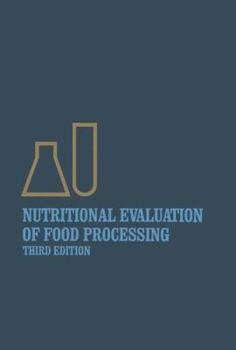Nutritional Evaluation of Food Processing
Select Format
Select Condition 
Book Overview
Dramatic changes in the attitudes toward human nutrition have taken place dur- ing the past decade. Food-related and medical professionals as well as consumers are now, more than ever before, aware of and concerned about diet, nutrition, and the beneficial and deleterious effects of food processing upon nutrients. The old saying "We are what we eat" is still relevant. Nutritious food will contribute greatly to consumers' good health and ultimately reduce medical bills. Food processing is essential to maintaining our food reserves from one harvest to another, thus letting us serve our daily meals regularly. If food processing is defined as including all treatments of foodstuffs from harvest to consumption, then more than 95% of our food may be considered as processed. In most cases, food processing and storage cause some reduction in the nutritional value of foods. Advances in food science and food technology have resulted in an increase in nu- trient retention after processing. In addition, today's consumer better understands how to avoid excessive nutrient losses during food preparation. The information presented in this completely revised reference and textbook will help the reader to understand better the relationship between food processing and nutrient retention. The authors' scholarly contributions are greatly appreciated.
Format:Paperback
Language:English
ISBN:9401170320
ISBN13:9789401170321
Release Date:June 2012
Publisher:Springer
Length:786 Pages
Weight:2.43 lbs.
Dimensions:1.6" x 6.1" x 9.2"
Customer Reviews
0 rating





